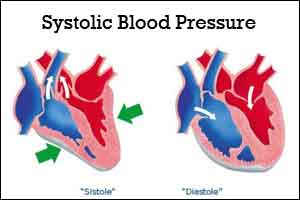- Home
- Editorial
- News
- Practice Guidelines
- Anesthesiology Guidelines
- Cancer Guidelines
- Cardiac Sciences Guidelines
- Critical Care Guidelines
- Dentistry Guidelines
- Dermatology Guidelines
- Diabetes and Endo Guidelines
- Diagnostics Guidelines
- ENT Guidelines
- Featured Practice Guidelines
- Gastroenterology Guidelines
- Geriatrics Guidelines
- Medicine Guidelines
- Nephrology Guidelines
- Neurosciences Guidelines
- Obs and Gynae Guidelines
- Ophthalmology Guidelines
- Orthopaedics Guidelines
- Paediatrics Guidelines
- Psychiatry Guidelines
- Pulmonology Guidelines
- Radiology Guidelines
- Surgery Guidelines
- Urology Guidelines
Extreme swings in BP as dangerous as consistently high BP

Extreme ups and downs in systolic blood pressure may be just as deadly as having consistently high blood pressure, according to a new study from the Intermountain Medical Center Heart Institute in Salt Lake City.
Following a review of electronic medical records, researchers from the Intermountain Medical Center Heart Institute discovered that patients with systolic blood pressure numbers that varied by as much as 30 or 40 between doctor visits over an extended period of time were more likely to die than those with less extreme variances in their blood pressure.
The systolic blood pressure reading (the upper number) indicates how much pressure blood is exerting against the artery walls when the heart beats. According to the American Heart Association, a normal systolic blood pressure is less than 120. High blood pressure is categorized as above 140.
"Blood pressure is one of those numbers we encourage people to keep track of, as it's one indicator of your healthy heart," said Brian Clements, DO, an internal medicine specialist with the Intermountain Medical Center Heart Institute, and lead invesigator of the study. "The takeaway from the study is, if you allow your blood pressure to be uncontrolled for any period of time, or notice big changes in your blood pressure between doctor visits, you increase your risk of stroke, heart attack, kidney or heart failure, or even death."
Results of the study of nearly 11,000 patients will be reported at the 2017 American Heart Association Scientific Sessions in Anaheim, CA, on Monday, November 13, at 12:45 p.m., PST.
Researchers at the Intermountain Medical Center Heart Institute modeled their study after an analysis of the largest hypertension clinical trial ever conducted - the Antihypertensive and Lipid-Lowering Treatment to Prevent Heart Attack Trial (ALLHAT).
They examined the visit-to-visit variability of systolic blood pressure in 10,903 patient records from Intermountain Healthcare facilities. The patients were required to have had seven blood pressure measurements between 2007 and 2011. After the date of their seventh recorded systolic blood pressure measurement, the patients were followed for five years, with researchers looking at all causes of mortality.
"The call to action for patients as a result of this study is to do everything they can to control their blood pressure on a regular basis," said Dr. Clements. "Eat healthy foods, exercise regularly, and if your doctor has prescribed you medications for your blood pressure, be sure and take them consistently. Because any time your blood pressure is out of control, you're at higher risk of injury or death."
In most people, systolic blood pressure rises steadily with age due to increased stiffness of large arteries, long-term build-up of plaque, and increased incidence of cardiac and vascular disease, according to the American Heart Association.
Dr. Clements also recommends that people control their environment when measuring their blood pressure to help reduce additional variables from influencing the measurement.
- Sit or lay down for 15 minutes prior to taking your blood pressure. Don't do things that will cause you stress, as that may raise your blood pressure.
- Use a blood pressure cuff that fits. Make sure it's not too tight or too large.
"After the ALLHAT study, we were in a unique position because Intermountain Healthcare has such a rich database of records that are perfect for identifying trends and outcomes," said Dr. Clements. "In this case, we're working to identify the cause of the variances in systolic blood pressure and learn if it's an independent predictor of mortality, thus helping clinicians work with their patients to better manage their heart health."

Disclaimer: This site is primarily intended for healthcare professionals. Any content/information on this website does not replace the advice of medical and/or health professionals and should not be construed as medical/diagnostic advice/endorsement or prescription. Use of this site is subject to our terms of use, privacy policy, advertisement policy. © 2020 Minerva Medical Treatment Pvt Ltd